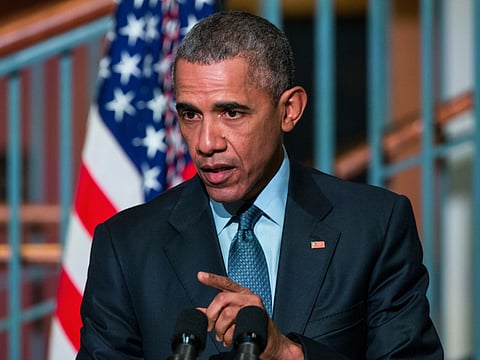Closer to political solutions in Syria and Israel?
The recent Vienna meeting and Obama’s impending parley with Netanyahu offer opportunities to find answers to key regional crises

The belated decision by the Obama administration to send less than 50 — yes, 50 — American soldiers to Syria to curtail the uprising by terrorists of Daesh (the self-proclaimed Islamic State of Iraq and the Levant) in the nearly five-year uprising hardly triggered any joyful reaction locally among groups within the country. If anything, it was an obvious response to the loud Russian military onslaught that started several weeks earlier with the same goal in sight.
Actually, the decision of this deployment follows America’s admission of the failure of a previous Pentagon programme to train and arm Syrian rebels fighting Daesh. The new Special Operations advisers will be working with the Syrian resistance forces in northern Syria, combatting Daesh, but will not engage in direct combat.
“While the deployment was small in scale,” reported the New York Times, “it was large in importance for a president who had refused to commit American ground forces inside Syria beyond quick raids.” It was also stressed that these forces do not have “a combat mission” but “to offer advice and assistance to those local forces about the way they can organise their efforts to take the fight to [Daesh] ...”
But this step underlines the failure of American diplomacy in the Middle East since the American invasion several years ago of Iraq, ordered by former United States president George W. Bush, that led to the overthrow of Iraqi president Saddam Hussain. Nowadays, the ongoing uprising against the regime of Syrian President Bashar Al Assad has sadly led thousands of Syrians to flee their homeland, first to their neighbouring countries — Jordan and Lebanon — and, at present, to Europe where some countries are harshly resisting their arrival.
Alongside the Syrian upheaval, the Middle East is still embroiled in a bloody Palestinian-Israeli conflict, which, in the past month, according to the Palestinian Ministry of Health, has seen 74 Palestinians killed since early October, including 15 children, and more than 2,250 Palestinians injured.
Israeli Prime Minister Benjamin Netanyahu is scheduled to arrive in Washington on Monday for talks with US President Barack Obama. All eyes will be on the meeting as the world will wonder what Obama — who was severely attacked by the Israeli leader in a surprise appearance in the US Congress earlier, when he criticised America’s relationship with Iran — will do next.
The question remains whether the American president will twist the arms of Netanyahu over the continued Israeli occupation of Palestinian Territory, particularly in the West Bank and occupied East Jerusalem — a situation that has been the case for the last 50 years — and the handling of Palestinians by brutal Israeli police and soldiers.
The recent meeting in Vienna — convened by Russian Foreign Minister Sergei Lavrov and which included the foreign ministers of the US, Saudi Arabia and Turkey — aimed at working out a solution to the conflict in Syria, especially now that all parties seem willing to tolerate the presence of Syrian President Bashar Al Assad for the transitional period.
Russia has reportedly come to realise lately the importance of ending military operations in Syria, prompting it to start a political process that was reflected in Russian President Vladimir Putin’s actions especially his meeting in Moscow with the Syrian president.
This approach was stressed by Foreign Minister of the European Union, Federica Mogherini, who said: “It is necessary to include [Al] Assad in the political transition process in Syria. We have learned our lessons in Iraq, we must ensure that the political process and transformation maintain the integrity of the components of society and include them in the process.”
In view of the current scenario, Obama has an opportunity to repeat the same point when he meets Netanyahu, who should, for a start, accept the idea of a Palestinian state on all Palestinian territory occupied by Israel since 1967 — a situation that has been acknowledged by many states and international institutions, especially the United Nations. My assumption here is that Netanyahu should want to improve his image — which has taken a beating owing to his recent foul pronouncements — and try and move a step closer to a political solution. Time is definitely running out on a peaceful solution for all.
George S. Hishmeh is a Washington-based columnist. He is a former editor-in-chief of the Daily Star.
Sign up for the Daily Briefing
Get the latest news and updates straight to your inbox


